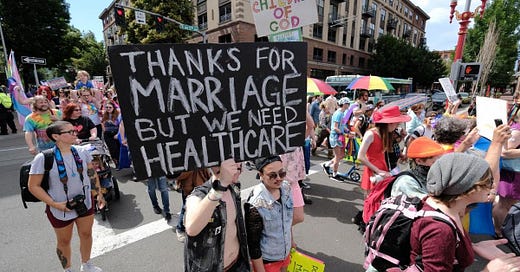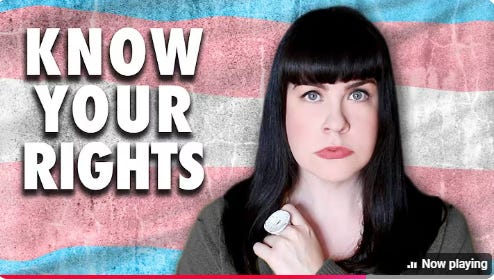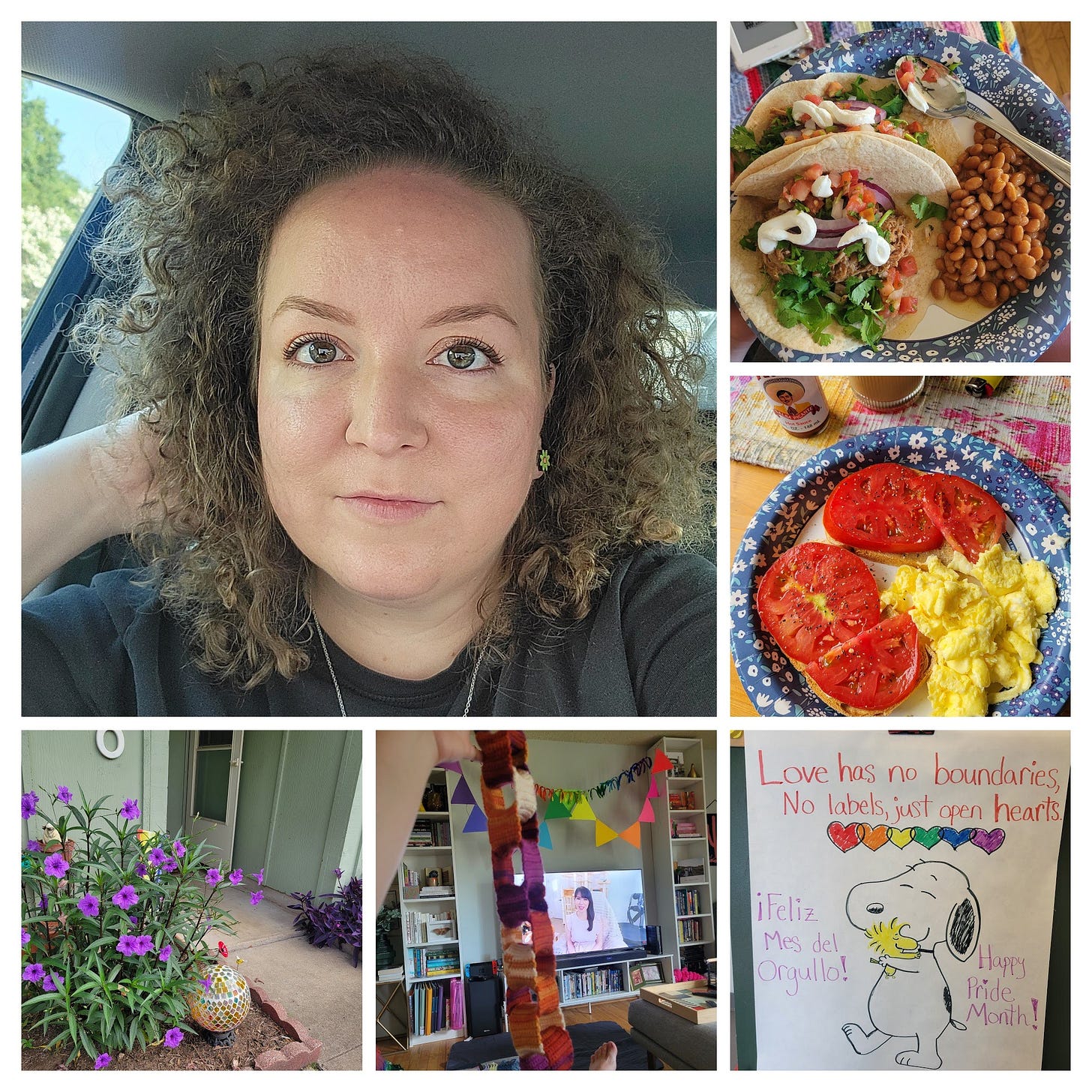ADVANCE CARE PLANNING FOR THE YOUNG & INVINCIBLE
How to get your affairs in order when death is mostly theoretical
Happy Pride Month! I’m going to celebrate by talking about my favorite subject: advance care planning! Hurray!
In all seriousness, a big part of celebrating Pride is recognizing the hard won legal advances, protections and processes that queer people have fought for, and the very real threats that still exist within our medical and legal systems today. While we will never be able to fully escape or avoid these harms, we do fortunately have several tools at our disposal to maximize the chances that we are treated with respect while alive and dead.
While much of the language I’ll be using in this post is focused on the needs of queer people, all of these tools are helpful for young people thinking about how to do advance care planning when death is not imminent or likely. Trauma happens, illness happens. Once you hit your mid-thirties, people do start dying from cancer and other disease more often, and it’s important to take steps to protect ourselves and our families as much as we can. We can’t anticipate everything, but we can prevent some specific horrors with a few free or cheap resources and a notary. Just so you know, I am a Texas notary! If you are a newsletter subscriber and live in the Austin area, I am always happy to provide my services for free if you are willing to come to me. Just send me a message if you need me.
The following is not comprehensive legal or medical advice by any means. It is meant to be a starting point for taking very basic steps to mitigate the damage that worst case scenarios can cause. If you have a more complex medical, legal or financial situation and want to be sure you are getting sound advice, it is always wise to contact an estate planning attorney in your area.
A medical power of attorney is a legal document that gives someone you trust the authority to make medical decisions on your behalf if you are unable to speak for yourself. Most of the time, this is when you are physically unable to speak for yourself—perhaps you were in a car accident or became very ill and are in the ICU, intubated and sedated to the point to where you are unable to process information or respond to questions. It could also be if you are ever having a psychiatric crisis so severe that you have been deemed incapable of making good choices about your health and wellbeing. Medical power of attorney gives people the ability to give consent for surgeries, procedures, medications, and changes to code status (like removal of life-sustaining technology) for you. If you have not filled out a medical power of attorney form, decision-making power will go to your legal next of kin. If you are married, your spouse is your legal next of kin. If you aren’t married, your legal next of kin is your adult child. If you aren’t married and have no adult children, it’s your parents—so on and so forth. If you trust your legal next of kin, great! You don’t really need a medical power of attorney unless you just want to give them extra formal power in the medical system. It’s very common, though, for people to not want their legal next of kin to make medical decisions for them. In this case, you should google “medical power of attorney form for [your state]” and get it filled out ASAP. These forms are state dependent, so if you move, you have to get a new one filled out. Also, if you have a marriage that some people might be inclined to doubt or dispute (like a queer marriage), you might want to keep a copy of your marriage license with your medical power of attorney form if you want to ensure your spouse has this ability.
Agent for disposition of remains
Fun fact: did you know that after you die, your body isn’t legally considered a person anymore? Your dead body becomes part of your estate, and a whole new set of forms is needed for someone to be able to make unilateral decisions about whether you are buried or cremated, what name is on your headstone, etc. Just because someone was your medical power of attorney when you were alive doesn’t mean the funeral home will be able to honor them as your sole funeral decision maker after you’ve died, especially if your legal next of kin are raising a ruckus about wanting to use your dead name or preventing certain people from speaking at the services. Caitlin Doughty created an excellent video about this a few years ago and it’s what got me interested in learning more about our rights after we die. The most rock solid way to go about determining who has this power is to create a will with a lawyer, but you can also create some protections with a free agent for disposition of remains form. This form appoints a trusted individual to carry out your known wishes for your remains after you have died. This is the form for Texas.
Five Wishes is an advance care planning guide that was designed to meet the medical and legal requirements of most states to serve as advance directives for physicians about healthcare decisions. If you live in Texas (womp), Kansas, Ohio or New Hampshire, you can still fill out Five Wishes, you will just need to take additional steps such as signing the MPOA form discussed above. Five Wishes asks questions about what kind of medical care you would want to receive if you were very sick and might not survive, or may be dependent on medical technology like a feeding tube or ventilator to survive outside of the hospital. It also asks questions about your values, your comfort, your important relationships, and steps you would want people to take if you were going to die. The digital version is available online for about 8 bucks and makes thinking about these difficult topics much easier than trying to figure it out on your own.
Life insurance beneficiary
Have you updated that old life insurance policy you got through your job when you started ten years ago? Is it still your mom when you actually want it to be your spouse? Go ahead and update that while you’re thinking about it.
Important documents
Do you know where all your important documents are, like your birth certificate, social security card, passport, marriage license, car title, tax returns, bank account information, etc. is? I keep all of mine inside of a binder in my office, clearly labeled. If you fill out any advance care planning documents like the MPOA, disposition agent forms, a will, or Five Wishes-style documents, copies of those should go in there, too.
Do a little research
When you’re young and invincible, it’s unlikely you have done much research about what kind of medical technology you might need to survive a devastating car crash or septic shock, or what kind of funeral (or lack of one) you might want to have. You don’t have to know exactly what you want or what makes sense for you, but it might be a good idea to have a general familiarity with things. Do you absolutely hate the idea of being buried in a creepy cemetery? Your family should probably know that. Does the idea of being put into a giant fire and reduced to ash squick you out? That’s also probably important to know. Is there a family cemetery or funeral home you know you want to use? A certain priest or pastor that you would want to hold your services? Jotting all of these things down and getting them out of your brain and onto paper is immensely helpful if the worst-case scenario happens. Additionally, there is a lot of fear-mongering about life support technology and resuscitation measures. Yes, CPR is violent and hard on your body, and being reliant on a tracheostomy and ventilator to breathe absolutely sucks and changes your life entirely. However, the alternative to these things is often “being dead.” The graphics on this video are kind of goofy (and trigger warning for discussing airplane crashes and a not great job of describing CPR) but it does a good job overall of describing the most common types of life support interventions in the hospital. For many people, the violence of life-saving means is worth it if it means they have a shot at getting better and spending more time with their family. Other people know they absolutely do not want to be kept alive if their brain is significantly damaged, or if they wouldn’t be able to eat or walk on their own. I recommend thinking about what your values are and what kind of quality of life would feel unacceptable to you and finding a simple way to communicate those things with your family and/or MPOA.
A few years ago, I was tasked with creating guiding principles for our pediatric hospice and palliative care team. After much thought and discussion with my colleagues, this is what I came up with:
Reduce suffering when possible.
Help make meaning of unavoidable suffering.
Facilitate honest, empathetic communication.
Provide equitable care for all patients.
A lot of people shy away from engaging in advanced care planning because they are worried it will make them anxious or trigger patterns of unwanted thoughts. You know yourself best, so if this topic is truly going to harm you more than help, don’t force yourself to engage. I do think it is important to consider that advance care planning may be more empowering and less morbid than you think, however. There is so much destruction and violence happening in our world today that we have very little influence or control over—it may feel really good to spend a small amount of time and energy putting things in place that you know would directly reduce the amount of suffering you and your loved ones experience. If some of the suffering is unavoidable, such as unexpected death, your advance care planning work can help your family make meaning out of a meaningless event by feeling confident they were able to uphold your wishes. Advance care planning gives you an opportunity to engage in open discussion with your loved ones and create opportunities for bonding and connection. I don’t know about you, but it would feel very powerful and meaningful for me to know that someone I love trusts me to care for their body and person when they are at their most vulnerable. And finally, it does help preserve access to equitable care as much as possible in a time when queer and trans healthcare rights and freedoms are being limited and destroyed entirely.
This summer is definitely going to be one for the books…there’s not much I can share yet, but I will have LOTS of exciting updates soon! In the meantime, things I have been enjoying are:
Pineapple pulled pork tacos that I made in the crockpot, very excellent.
Tomato toast season with tomatoes from my mom’s garden.
The implication that Snoopy and Woodstock are in a gay romantic entanglement.
The homemade pride decor I’ve been making.
Mexican petunias in full bloom.








Saving this to get started on when I come back from tour 🫡